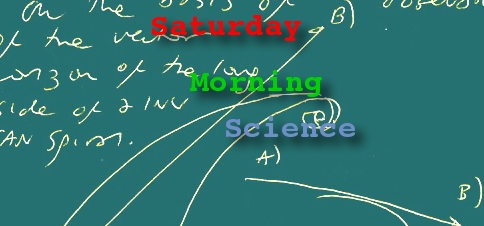Saturday Morning Science 004
The problem is a simple one, despite being the storehouse for the knowledge of an entire planet sometimes the Internet can be a bore. Facebook, YouTube and Twitter present us with a world of ideas, tiny ideas, iterations of personal data, statements, hopes, curses and bleats amounting to a wall of cozy noise; full of sound and fury. Here are five sites on the web, five oasis in the sometime wasteland, five challenging places that reward the time spent with them.
Feynman’s Robb Lectures– Anyone with an internet connection can attend this series on lectures given by the late Richard Feynman, Nobel prize winning physicist and amatuer bongo player. His street inflected, New Yorker’s accent and humour are the perfect voice for this four part series on quantum mechanics delivered in 1979 at the University of Auckland in New Zealand. The simple fact that this exists is one of those “things about the World Wide Web” that makes me glad it exists. It will take you just under six and a quarter hours to watch the entire series and maybe the rest of your life to understand it but it’s worth it.
Dynamic Periodic Table-Click and play. This is a simple or as complex as you want it to be; a Web 2.0, interactive Periodic Table of Elements. Play with the temperature controls. Did you know that at Absolute Zero, everything is solid except for a defiantly liquid Helium? Poke an element to link to its Wikipedia entry, its properties, its orbitals and isotopes. Go wide, narrow and deep. Have fun.
Marketplace of Ideas/interview with Keith Devlin– Stream or download to your mp3 player this instalment of Colin Marshall’s Marketplace of Ideas. Usually MOI runs to the softer side of arts and letters and Marshall is an excellent interviewer for getting vanguard artists and critics to speak up for themselves but he can do a good job on science as well. Here, he talks with Devlin about his book, The Unfinished Game. Devlin’s study of the written correspondence between Fermat and Pascal presents us with the beginnings of how we now understand chance, randomness and probability.
Celestia-It runs on Windows, MacOS or Linux. It’s a portable planetarium that allows you to navigate from Earth out into the intergalactic void faster than light. Go anywhere literally. The dataset is constantly updated through add-ons from both current research and science fiction. It’s as profound and as trivial as you want your universe to be.
MIT Courses/ Physics 8.01-Prof. Walter Lewin gives the kind of physics lectures that you wish you had in high school. There’s a Rube Goldburg/Buster Keaton vibe to this series that restores Physics to the physical. This all part of MIT’s Open Courseware series which is yet another great internet resource.





